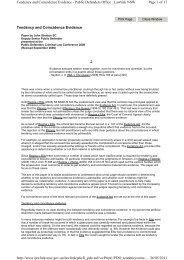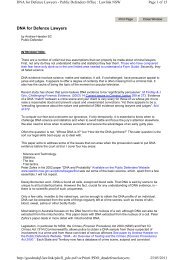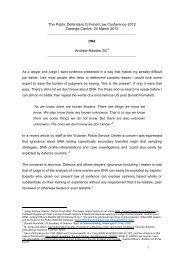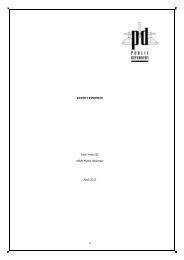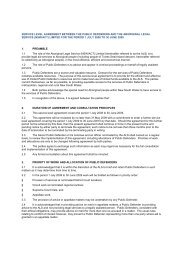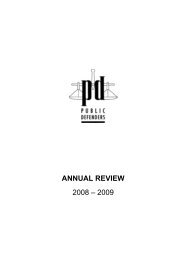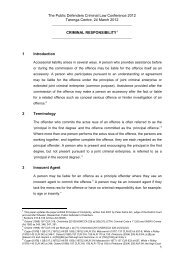Right to Silence: inferences from silence - The Public Defenders
Right to Silence: inferences from silence - The Public Defenders
Right to Silence: inferences from silence - The Public Defenders
Create successful ePaper yourself
Turn your PDF publications into a flip-book with our unique Google optimized e-Paper software.
(a)<br />
(b)<br />
the accused’s guilt is not in issue; or<br />
it appears <strong>to</strong> the court that the physical or mental condition of the accused<br />
makes it undesirable for him <strong>to</strong> give evidence;<br />
but subsection (2) below does not apply if, at the conclusion of the evidence for the<br />
prosecution, his legal representative informs the court that the accused will give<br />
evidence or, where he is unrepresented, the court ascertains <strong>from</strong> him that he will<br />
give evidence.<br />
(2) Where this subsection applies, the court shall, at the conclusion of the evidence for<br />
the prosecution, satisfy itself (in the case of proceedings on indictment, in the<br />
presence of the jury) that the accused is aware that the stage has been reached at<br />
which evidence can be given for the defence and that he can, if he wishes, give<br />
evidence and that, if he chooses not <strong>to</strong> give evidence, or having been sworn, without<br />
good cause refuses <strong>to</strong> answer any question, it will be permissible for the court or jury<br />
<strong>to</strong> draw such <strong>inferences</strong> as appear proper <strong>from</strong> his failure <strong>to</strong> give evidence or his<br />
refusal, without good cause, <strong>to</strong> answer any question.<br />
(3) Where this subsection applies, the court or jury, in determining whether the accused<br />
is guilty of the offence charged, may draw such <strong>inferences</strong> as appear proper <strong>from</strong> the<br />
failure of the accused <strong>to</strong> give evidence or his refusal, without good cause, <strong>to</strong> answer<br />
any question.<br />
(4) This section does not render the accused compellable <strong>to</strong> give evidence on his own<br />
behalf, and he shall accordingly not be guilty of contempt of court by reason of a<br />
failure <strong>to</strong> do so.<br />
(5) For the purposes of this section a person who, having been sworn, refuses <strong>to</strong> answer<br />
any question shall be taken <strong>to</strong> do so without good cause unless—<br />
(a)<br />
(b)<br />
he is entitled <strong>to</strong> refuse <strong>to</strong> answer the question by virtue of any enactment,<br />
whenever passed or made, or on the ground of privilege; or<br />
the court in the exercise of its general discretion excuses him <strong>from</strong> answering<br />
it.<br />
……<br />
(7) This section applies—<br />
(a)<br />
(b)<br />
in relation <strong>to</strong> proceedings on indictment for an offence, only if the person<br />
charged with the offence is arraigned on or after the commencement of this<br />
section;<br />
in relation <strong>to</strong> proceedings in a magistrates’ court, only if the time when the<br />
court begins <strong>to</strong> receive evidence in the proceedings falls after the<br />
commencement of this section.<br />
Consolidated Criminal Practice Direction, para. IV.44<br />
Defendant’s right <strong>to</strong> give or not <strong>to</strong> give evidence<br />
IV.44.1 At the conclusion of the evidence for the prosecution, section 35(2) of the<br />
Criminal Justice and <strong>Public</strong> Order Act 1994 requires the court <strong>to</strong> satisfy itself that the<br />
Colin Wells July 2013 Page 16



